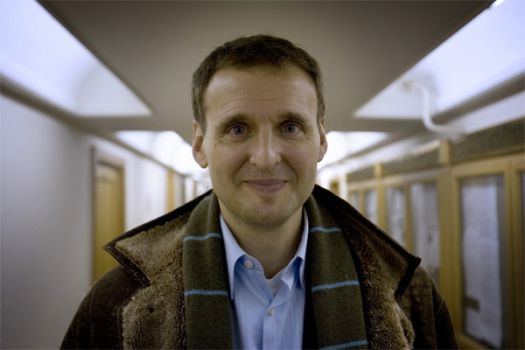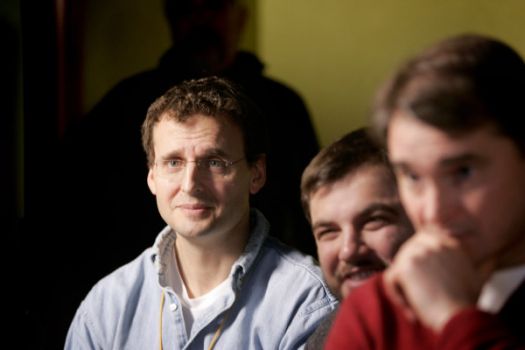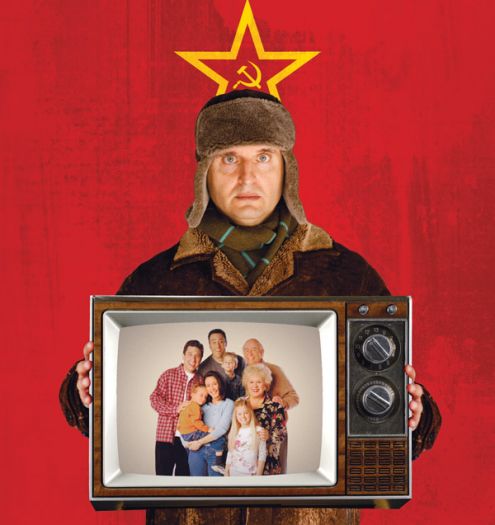On Tuesday, Phil Rosenthal will make his Blu-ray debut -- sort of. Rosenthal has had bit parts in front of the camera over the years, but he's best known as the creator of the classic sitcom Everybody Loves Raymond. Now, he will soon be known to home audiences as the guy that dared to try Exporting Raymond.
TV has inspired plenty of movies. However, this could be the first movie to be inspired by the remake of a TV show for TV. It's something that Rosenthal says never crossed his mind. Yet in Exporting Raymond, he invites us to join him on a cross-continental adventure to watch, learn and laugh, as Rosenthal tries to get Raymond remade for Russian audiences.
Big Picture Big Sound: Before Russia had called, did you ever think about exporting Everybody Loves Raymond?
Phil Rosenthal: It never entered my mind. I was just so happy that somebody even liked the pilot script of the show enough to let me try to cast it. All the planets have to line up to have any success at all, and I felt immensely grateful having been in the business for a little while and knowing the odds. So I just felt so lucky and grateful and then this came up. Sony asked would I like to go to Russia and try to do my show over there and film the whole thing for a movie. I thought, "Wow. That's an undeniable adventure. I have to do it." And I was thrilled to do it until I heard that I needed kidnap and ransom insurance.

BPBS: Is that what happened? Sony approached you and said they thought this would make an interesting movie?
Phil Rosenthal: There hadn't been sitcoms in Russia before Sony brought The Nanny over there and translated it to do it. The head of Sony asked me how would I like to go over and observe how they work with the Russians and come back to America and write a fictional feature film about the creator of a show who goes to Russia to have his show translated. So I said, if the situation really exists and the people you're telling me about really exist, why not bring a camera crew over there and film what would really happen? And then he said, "I love that idea. How would you like to go try to do Raymond over there and film the whole process?" So that's how it came about. The movie came first.
BPBS: How big was the camera crew that you used?
Phil Rosenthal: We had three Americans and three Russians. This was my big directorial choice before I went over there, was to bring two cameras, which usually is not done. In an effort to save money, you use one camera and you kind of cheat reaction shots. I didn't want to cheat anything. I thought if this movie was going to be about anything, it's probably going to be about how I react to them and how they react to me.
BPBS: The reactions were important, but did you have any other ideas of how you wanted the movie to look or what imagery you wanted to show?
Phil Rosenthal: It was all about filming who was speaking. I wanted to film who was speaking and film the reaction. That's all I wanted. And yes, since we're going to Moscow, I think we'd better show the greatest structures in Moscow because you want to have a sense of place. But that really was my shot list. That was it.
BPBS: We heard that you are a bit of a techie, and you even mention the boost of Blu-ray in the beginning of the commentary. What does the viewer get out of watching this film on Blu-ray versus the standard-def DVD?
Phil Rosenthal: What they get from any Blu-ray compared to a DVD; I think it's five or six times the resolution of a DVD? Everything just looks fantastic on Blu-ray if they master it right. I personally supervised the mastering with our producer John Woldenberg at Sony and made sure it was right. I have this equipment at home, and I want it for my own use for Blu-ray. I cared deeply that this is the way, especially a small movie and especially a documentary, is the way it's going to be seen for the rest of its life. Not in movie theaters, but at home. So why not want it to be as good as it can look? Plus, you get all of the extras, too. Like we put two full episodes of the Russian version, with subtitles, on the Blu-ray and the DVD, and the two original American episodes that they're based on. Then, you get the commentary, you get the usual deleted scenes, the trailer.

BPBS: Do you have a favorite special feature?
Phil Rosenthal: My favorite thing is my father, who is on OldJewsTellingJokes.com. It's a website where he's one of many old Jews telling old jokes. He so hilarious that I took my favorite joke that he does and put it on the Blu-ray and the DVD, in all his glory. Most special features, you know what you're going to get: the boring commentary, the boring this, and I tried because I'm such a fan of DVDs and Blu-rays. I just figured, what would I want to see?
BPBS: Let's get back to the movie. Why was it so important to have a live audience?
Phil Rosenthal: Because it would keep it real. Once there's real people there, you can't be so exaggerated and broad. I thought it would help keep it real and I thought it would give the show an energy. They were filming with four cameras, and it seemed to look unnatural to me. They were filming it presentational style, except the only reason to film something presentational style is because you are presenting it to an audience sitting there. So they filmed it presentational style without the presentation! So I kept arguing, this is why you do it this way. You can have the audience, so the audience is contributing to the live event, the theatricality of it -- which by the way is in their own tradition. They invented naturalistic theater in Russia and for TV! They're just not interested.
BPBS: Were the chairs really the reason why they didn't want a live studio audience?
Phil Rosenthal: That was the exact reason. They would have to get chairs, meaning that it's too expensive. We're not bothering with the audience. Listen, you have to understand: An American production, a sitcom, is around $2 million for a half-hour. You know how much it is in Russia? All together, with everything: pre-production, post-production, the food on the set, the actors' salaries, the directors, everybody, all the equipment... $80,000. And I have to say, it looks it.
BPBS: The show is produced in many other countries. Why didn't you get involved with those versions?
Phil Rosenthal: Why do you think? I'll tell you what I'll do. I'll go to countries that I want to eat in. I've heard the food is pretty good in France. Let's go there. It doesn't have to be freezing 30-below-degree Moscow every time, does it?
BPBS: But you do consult?
Phil Rosenthal: I had a very simple rule. I wanted it to be relatable to their audience. A part of making it relatable, probably the biggest part of making it relatable, is the tone of the show. Keep it real. Could this happen or did this happen? That's really the only rule we had. Could this happen and no topical references that dates the show. So as long as they stick to those rules, really anybody who knows how sitcoms work could go over there in my place and guide them through it, and that's what we have.
BPBS: Well, can they can they handle their vodka? And more importantly, did you get violently ill during the filming of this movie?
Phil Rosenthal: Not violently, but the room was spinning a little bit. I'll tell you the truth of how I was able to handle it. I'm a real man. That's what we've learned today.

Exporting Raymond is available on Blu-ray and DVD starting August 2, 2011. Check out our review of the Exporting Raymond Blu-ray for more information.